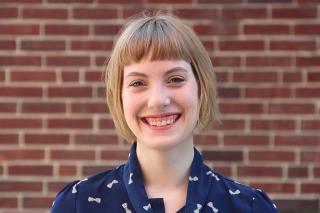Christina Howe '17 shares her path to studying biostatistics at the doctoral level.
Can you tell us about your career since graduation and your current position?
I graduated from Simmons in May 2017 with degrees in nursing, mathematics, and biostatistics. That summer I was a post-baccalaureate intern in the Harvard Summer Program in Biostatistics and Computational Biology, working on the impact of air pollution on maternal health outcomes. After that I worked as a bedside nurse at MedStar Georgetown University Hospital until beginning the PhD program in Biostatistics at Harvard University in August 2018.
Is this the path you had intended to pursue while you were at Simmons?
I transferred to Simmons from community college originally intending to become a nurse practitioner and maybe do some clinical research. I loved MATH 227 with Professor Robert Goldman and MATH 338 with Professor Michael Brown and decided to add a double major in biostatistics. I wasn't sure what I wanted to do with that degree until my summer internship at Harvard, which helped me define my next steps. I loved the larger scale of public health as compared to individual patient care and that my healthcare knowledge could help me better understand clinical data.
What kind of research are you doing during your PhD?
My research is a continuation of that summer project on the impact of air pollution exposure on maternal outcomes. I'm using existing clinical data on blood pressure measurements throughout the pregnancy, disease status for pre-eclampsia and gestational diabetes, and other health markers to see if air pollution seems to have an impact on the mothers. There are a lot of interesting statistical and public health issues here:
- What kinds of health disparities do we see and do socioeconomic and racial differences in these exposures help explain some of them?
- How do we determine which pollutant(s) are associated with any results we see?
- What would it take to say the relationship is causal?
- Should pregnant women be considered a "vulnerable population" that requires stricter limits on exposures?
I’m hoping that my results will help answer some of these questions.
What inspired you to get your PhD?
First, I love teaching—at Simmons I was a Teaching Assistant for Pharmacology and tutored for several classes—and a PhD is necessary for a faculty position should I choose to pursue that path. Second, I want to do independent research for which a masters is not adequate preparation. Third, PhD degrees are funded, so I'm provided with a stipend rather than having to pay tuition.
How did Simmons prepare you for your advanced studies?
The small classes at Simmons and the openness of the faculty led me to get to know my professors well. I was given a lot of advice and had personal recommendation letters when I applied for internships and to graduate schools. Also, R is a very common statistical software language that Professor Goldman requires you to learn for his courses. Because I already knew R, I was able to be more productive during my internship and could do more interesting work. The nursing department provided me with good clinical experiences that helped me get a nursing job before graduation and gave me the healthcare knowledge to understand the background of the statistical problems I'm working on now.
What advice would you offer current students?
Get to know your professors. They can guide you to career paths or graduate programs that you might not have otherwise considered. Also, finding internships is so important—the nursing program builds this in with clinical rotations and the final practicum, but students in other departments generally do not get that same level of real world experience through coursework. Internships and research assistantships are so useful for networking and for determining what work you want to do after graduation.

